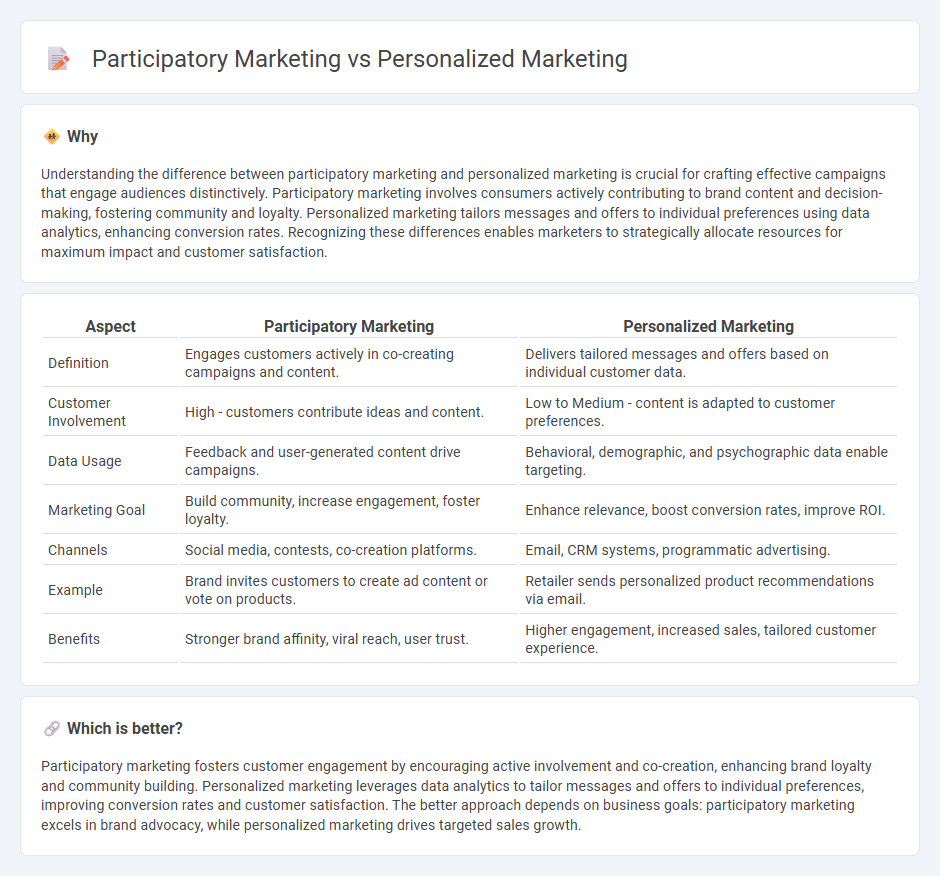
Participatory marketing engages customers by inviting their input and collaboration in brand campaigns, fostering a sense of community and co-creation. Personalized marketing leverages data analytics and customer insights to deliver tailored content, offers, and experiences that resonate individually. Explore how these strategies reshape customer relationships and drive business growth.
Why it is important
Understanding the difference between participatory marketing and personalized marketing is crucial for crafting effective campaigns that engage audiences distinctively. Participatory marketing involves consumers actively contributing to brand content and decision-making, fostering community and loyalty. Personalized marketing tailors messages and offers to individual preferences using data analytics, enhancing conversion rates. Recognizing these differences enables marketers to strategically allocate resources for maximum impact and customer satisfaction.
Comparison Table
| Aspect | Participatory Marketing | Personalized Marketing |
|---|---|---|
| Definition | Engages customers actively in co-creating campaigns and content. | Delivers tailored messages and offers based on individual customer data. |
| Customer Involvement | High - customers contribute ideas and content. | Low to Medium - content is adapted to customer preferences. |
| Data Usage | Feedback and user-generated content drive campaigns. | Behavioral, demographic, and psychographic data enable targeting. |
| Marketing Goal | Build community, increase engagement, foster loyalty. | Enhance relevance, boost conversion rates, improve ROI. |
| Channels | Social media, contests, co-creation platforms. | Email, CRM systems, programmatic advertising. |
| Example | Brand invites customers to create ad content or vote on products. | Retailer sends personalized product recommendations via email. |
| Benefits | Stronger brand affinity, viral reach, user trust. | Higher engagement, increased sales, tailored customer experience. |
Which is better?
Participatory marketing fosters customer engagement by encouraging active involvement and co-creation, enhancing brand loyalty and community building. Personalized marketing leverages data analytics to tailor messages and offers to individual preferences, improving conversion rates and customer satisfaction. The better approach depends on business goals: participatory marketing excels in brand advocacy, while personalized marketing drives targeted sales growth.
Connection
Participatory marketing and personalized marketing are interconnected through their focus on engaging customers to create tailored experiences and foster brand loyalty. Participatory marketing invites consumers to actively contribute content and feedback, which provides valuable data for crafting personalized marketing messages and offers. Leveraging these insights enhances customer satisfaction by delivering relevant, individualized interactions that strengthen brand-consumer relationships.
Key Terms
Personalized Marketing:
Personalized marketing leverages data analytics and customer insights to deliver tailored content, product recommendations, and targeted advertisements that enhance user engagement and conversion rates. This approach utilizes behavioral data, purchase history, and demographic details to create unique experiences for each consumer, driving higher ROI and customer loyalty. Explore in-depth strategies and benefits of personalized marketing to maximize your campaign effectiveness.
Customer Segmentation
Personalized marketing leverages customer segmentation to tailor messages based on demographic, behavioral, and psychographic data, enhancing relevance and engagement. Participatory marketing, however, involves customers directly in the creation and promotion process, fostering collaboration and community-driven content. Explore how each strategy uniquely harnesses customer segmentation to boost brand loyalty and conversion rates.
Data Analytics
Personalized marketing leverages data analytics to tailor messages and offers based on individual consumer behavior, preferences, and predictive modeling, enhancing customer engagement and conversion rates. Participatory marketing uses data analytics to facilitate collaboration between brands and consumers, encouraging user-generated content and co-creation, which builds authentic connections and community trust. Explore how data-driven insights shape these distinct marketing strategies to maximize customer loyalty and ROI.
Source and External Links
What Is Personalized Marketing? - Monetate - Personalized marketing is a strategy where marketers use data and analytics to deliver individualized experiences to customers, aiming to engage them on a personal level, increase revenue, and strengthen customer relationships by acting on customer intent-driven experiences at scale.
14 Useful Examples of Personalized Marketing Tactics | Indeed.com - Personalized marketing enhances customer engagement and loyalty by recognizing customers as unique individuals, providing relevant information, increasing conversion rates, improving convenience, and creating consistency across channels through tailored recommendations and data analysis.
What Is Personalized Marketing? | Mailchimp - Personalized marketing uses customer data like interests and purchase history to send the right message at the right time, making marketing communications unique to each individual, which improves targeting accuracy and drives revenue.
 dowidth.com
dowidth.com